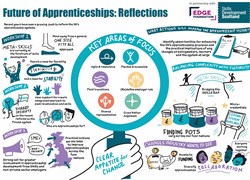SDS team up with Edge on future of apprenticeships
Experts have set out how apprenticeship systems can be improved to meet current and future skills demands in a collaboration between Skills Development Scotland and the Edge Foundation.
Experts have set out how apprenticeship systems can be improved to meet current and future skills demands in a collaboration between Skills Development Scotland and the Edge Foundation.
Three interactive workshops saw employers, policymakers and industry professionals examine what’s working and what can be improved to help people, employers and economies across the UK thrive.
Top priorities included the need for simplified apprenticeships that are more agile and responsive to socioeconomic change and deliver the technical and meta skills businesses demand.
Employers stressed a desire for closer connections with schools and transferable meta skills embedded in apprenticeships to build a resilient workforce and bolster lifelong learning.

Equality of opportunity
Participants also highlighted the need for good support and guidance in accessing apprenticeships to guarantee equity of opportunity to the benefit of individuals, enterprise and the economy, as well as broader employer involvement in apprenticeship design, delivery and assessment.
The sessions used presentations and workshops to explore trends impacting the labour market, international best practice, and the potential to improve and align apprenticeships in Scotland, England, Northern Ireland and Wales.
In the first workshop, The National Foundation for Educational Research shared research highlighting that digital and meta skills are at the forefront of current skills development.
Further research was shared highlighting the need to move away from a ‘one-size-fits-all’ model towards a more targeted approach to skills development.
Finnish academic Heta Rintala told the second session about recent reforms in her home country, which has introduced a modular approach to apprenticeships - with tailored pathways offering multiple routes to the same qualification. Meanwhile, the pros and cons of England’s employer-led approach to standards was scutinised.
Lewis Cooper, Director of the Four Nations College Alliance, drew attention to apprenticeship trends across the UK, with clear support for a more integrated approach to post-16 education and skills, the promotion of lifelong learning and improved employer engagement.
One key theme was the need for flexibility. Employers say they want a system agile enough to respond to changes in the socioeconomic environment.
For workers, this means having transferable skills they need to easily switch between jobs and industries. One solution to both issues was shorter, sharper skills development in the form of micro-credentials
Framework for the future
In the final session looking at actions and opportunities, Joanna Morrison from Diageo – which employs apprentices across the differing UK systems - spoke of the growing need among employers for meta skills, a simplified skills system and updates to current skills frameworks.
She stressed the importance of helping school pupils to build skills such as self-awareness and how to work with others, identify their learning needs, and integrate some of those factors into apprenticeship standards.
At the end of the series, a practical framework was developed for an apprenticeship system that works for everyone – agile, flexible, accessible enough to support a diversifying and aging workforce, and fluid enough that learners can transition more easily between work and education.
Summing up the sessions, Edge Foundation said the consensus established throughout the workshops "will undoubtedly mark an important moment as the four UK nations jointly adapt our apprenticeship systems to the changing needs of the 21st century."
Find out more
You can find written summaries and visual depictions of the series by clicking the button. here.